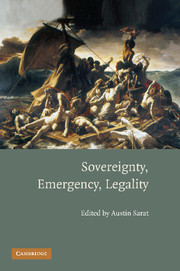Book contents
- Frontmatter
- Contents
- Contributors
- Acknowledgments
- Introduction: Toward New Conceptions of the Relationship of Law and Sovereignty under Conditions of Emergency
- 1 The “Organic Law” of Ex Parte Milligan
- Comment on Chapter 1: David Dyzenhaus, “The ‘Organic Law’ of Ex Parte Milligan”
- 2 Emergency, Legality, Sovereignty: Birmingham, 1963
- Comment on Chapter 2: “Order” in the Court
- 3 The Banality of Emergency: On the Time and Space of “Political Necessity”
- Comment on Chapter 3: Emergencies, Body Parts and Price Gouging
- 4 The Racial Sovereign
- Comment on Chapter 4: Toward a Nonracial Sovereign
- 5 Should Constitutional Democracies Redefine Emergencies and the Legal Regimes Suitable for Them?
- Comment on Chapter 5
- Index
5 - Should Constitutional Democracies Redefine Emergencies and the Legal Regimes Suitable for Them?
Published online by Cambridge University Press: 07 May 2010
- Frontmatter
- Contents
- Contributors
- Acknowledgments
- Introduction: Toward New Conceptions of the Relationship of Law and Sovereignty under Conditions of Emergency
- 1 The “Organic Law” of Ex Parte Milligan
- Comment on Chapter 1: David Dyzenhaus, “The ‘Organic Law’ of Ex Parte Milligan”
- 2 Emergency, Legality, Sovereignty: Birmingham, 1963
- Comment on Chapter 2: “Order” in the Court
- 3 The Banality of Emergency: On the Time and Space of “Political Necessity”
- Comment on Chapter 3: Emergencies, Body Parts and Price Gouging
- 4 The Racial Sovereign
- Comment on Chapter 4: Toward a Nonracial Sovereign
- 5 Should Constitutional Democracies Redefine Emergencies and the Legal Regimes Suitable for Them?
- Comment on Chapter 5
- Index
Summary
Introduction
Since the 9/11 2001 terrorist attacks on the United States, several Western constitutional democracies have resorted extraordinary emergency powers resulting in significant and, in many cases, seemingly excessive, curtailments of civil liberties. Traditional theory and practice drew a sharp divide between states of normalcy and states of emergency – usually in times of foreign or civil war – where the life of the polity was believed to be under threat. Global terror and the reaction against it involving the so-called “war on terror” raise serious challenges to this traditional approach.
Looking at these new challenges, I will argue that the traditional approach is inadequate to deal with the new dangers and challenges that confront the contemporary constitutional democracy, whether these stem from global or local terror in possession of increasingly devastating weapons, or from the spread of fundamentalist religion, or else from mass migrations or other massive social or economic dislocations due to globalization. I will advance the thesis that a more appropriate legal regime to deal with contemporary problems can be devised on the basis of a tripartite division distinguishing between conditions of emergency, conditions of stress, and conditions of normalcy. Focus on conditions of stress will reveal that in confronting certain contemporary threats, such as global terror and politically organized fundamentalist religion, the reinforcement of fundamental rights rather than their restriction in the pursuit of greater security may be best poised in many instances to safeguard and reinforce constitutional democracy.
- Type
- Chapter
- Information
- Sovereignty, Emergency, Legality , pp. 240 - 272Publisher: Cambridge University PressPrint publication year: 2010
- 1
- Cited by



